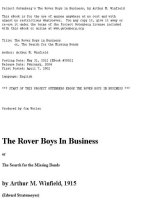Project Gutenberg''''s The Doctrine of Evolution, by Henry Edward Crampton pdf
Bạn đang xem bản rút gọn của tài liệu. Xem và tải ngay bản đầy đủ của tài liệu tại đây (1.48 MB, 829 trang )
Project Gutenberg's The Doctrine of
Evolution, by Henry Edward Crampton
This eBook is for the use of anyone
anywhere at no cost and with almost no
restrictions whatsoever. You may copy it,
give it away or re-use it under the terms of
the Project Gutenberg License included
with this eBook or online at
www.gutenberg.net
Title: The Doctrine of Evolution Its Basis
and Its Scope
Author: Henry Edward Crampton
Release Date: August 5, 2005 [EBook
#16442]
Language: English
*** START OF THIS PROJECT
GUTENBERG EBOOK THE DOCTRINE
OF EVOLUTION ***
Produced by Audrey Longhurst, Richard
Prairie and the Online Distributed
Proofreading Team at
Columbia University Lectures
THE DOCTRINE OF EVOLUTION
THE HEWITT LECTURES
1906-1907
COLUMBIA UNIVERSITY PRESS SALES
AGENTS
NEW YORK:
LEMCKE &
BUECHNER
30-32 WEST 27TH
STREET
LONDON: HUMPHREY MILFORD AMEN
CORNER, E.C.
COLUMBIA UNIVERSITY LECTURES
THE DOCTRINE OF EVOLUTION
ITS BASIS AND ITS SCOPE
BY
HENRY EDWARD CRAMPTON, PH.D.
PROFESSOR OF ZOÖLOGY, COLUMBIA
UNIVERSITY
New York
COLUMBIA UNIVERSITY PRESS
1916
All rights reserved
COPYRIGHT, 1911,
By THE COLUMBIA UNIVERSITY
PRESS
Set up and electrotyped.
Published June, 1911.
Reprinted December, 1912;
September, 1916.
Norwood Press
J.S. Cushing Co.—Berwick &
Smith Co.
Norwood, Mass., U.S.A.
PREFACE
The present volume consists of a series of
eight addresses delivered as the Hewitt
Lectures of Columbia University at
Cooper Union in New York City during
the months of February and March, 1907.
The purpose of these lectures was to
describe in concise outline the Doctrine of
Evolution, its basis in the facts of natural
history, and its wide and universal scope.
They fall naturally into two groups. Those
of the first part deal with matters of
definition, with the essential
characteristics of living things, and, at
greater length, with the evidences of
organic evolution. The lectures of the
second group take up the various aspects
of human evolution as a special instance
of the general organic process. In this
latter part of the series, the subject of
physical evolution is first considered, and
this is followed by an analysis of human
mental evolution; the chapter on social
evolution extends the fundamental
principles to a field which is not usually
considered by biologists, and its purpose
is to demonstrate the efficiency of the
genetic method in this department as in all
others; finally, the principles are extended
to what is called "the higher human life,"
the realm, namely, of ethical, religious,
and theological ideas and ideals.
Naturally, so broad a survey of knowledge
could not include any extensive array of
specific details in any one of its divisions;
it was possible only to set forth some of
the more striking and significant facts
which would demonstrate the nature and
meaning of that department from which
they were selected. The illustrations were
usually made concrete through the use of
photographs, which must naturally be
lacking in the present volume. In preparing
the addresses for publication, the verbal
form of each evening's discussion has
been somewhat changed, but there has
been no substantial alteration of the
subjects actually discussed.
The choice of materials and the mode of
their presentations were determined by the
general purpose of the whole course. The
audiences were made up almost
exclusively of mature persons of
cultivated minds, but who were on the
whole quite unfamiliar with the technical
facts of natural history. It was necessary to
disregard most of the problematical
elements of the doctrine so as to bring out
only the basic and thoroughly
substantiated principles of evolution. The
course was, in a word, a simple message
to the unscientific; and while it may seem
at first that the discussions of the latter
chapters lead to somewhat insecure
positions, it should be remembered that
their purpose was to bring forward the
proof that even the so-called higher
elements of human life are subject to
classification and analysis, like the facts
of the lower organic world.
It may seem that the biologist is straying
beyond his subject when he undertakes to
extend the principles of organic evolution
to those possessions of mankind that seem
to be unique. The task was undertaken in
the Hewitt Lectures because the writer
holds the deeply grounded conviction that
evolution has been continuous throughout,
and that the study of lower organic forms
where laws reveal themselves in more
fundamental simplicity must lead the
investigator to employ and apply those
laws in the study of the highest natural
phenomena that can be found. Another
motive was equally strong. Too frequently
men of science are accused of restricting
the application of their results to their own
particular fields of inquiry. As individuals
they use their knowledge for the
development of world conceptions, which
they are usually reluctant to display before
the world. It is because I believe that the
accusation is often only too well merited
that I have endeavored to show as well as
circumstances permit how universal is the
scope of the doctrine based upon the facts
of biology, and how supreme are its
practical and dynamic values.
It remains only to state that the present
volume contains nothing new, either in
fact or in principle; the particular form
and mode of presenting the evolutionary
history of nature may be considered as the
author's personal contribution to the
subject. Nothing has been stated that has
not the sanction of high authority as well
as of the writer's own conviction; but it
will be clear that the believers in the truth
of the analysis as made in the later
chapters may become progressively
fewer, as the various aspects of human life
and of human nature are severally treated.
Nevertheless, I believe that this volume
presents a consistent reasonable view that
will not be essentially different from the
conceptions of all men of science who
believe in evolution.
CONTENTS
CHAPTER PAGE
I. EVOLUTION. THE LIVING ORGANISM
AND ITS NATURAL HISTORY 1
II. THE STRUCTURE AND DEVELOPMENT
OF ANIMALS AS EVIDENCE OF
EVOLUTION 35
III. THE EVIDENCE OF FOSSIL REMAINS
73
IV. EVOLUTION AS A NATURAL PROCESS
106
V. THE PHYSICAL EVOLUTION OF THE
HUMAN SPECIES AND OF HUMAN RACES
150
VI. THE MENTAL EVOLUTION OF MAN
197
VII. SOCIAL EVOLUTION AS A
BIOLOGICAL PROCESS 241
VIII. EVOLUTION AND THE HIGHER
HUMAN LIFE 278
INDEX 313
I
EVOLUTION. THE LIVING ORGANISM
AND ITS NATURAL HISTORY
The Doctrine of Evolution is a body of
principles and facts concerning the present
condition and past history of the living and
lifeless things that make up the universe. It
teaches that natural processes have gone
on in the earlier ages of the world as they
do to-day, and that natural forces have
ordered the production of all things about
which we know.
It is difficult to find the right words with
which to begin the discussion of so vast a
subject. As a general statement the
doctrine is perhaps the simplest formula
of natural science, although the facts and
processes which it summarizes are the
most complex that the human intellect can
contemplate. Nothing in natural history
seems to be surer than evolution, and yet
the final solution of evolutionary problems
defies the most subtle skill of the trained
analyst of nature's order. No single human
mind can contain all the facts of a single
small department of natural science, nor
can one mind comprehend fully the
relations of all the various departments of
knowledge, but nevertheless evolution
seems to describe the history of all facts
and their relations throughout the entire
field of knowledge. Were it possible for a
man to live a hundred years, he could only
begin the exploration of the vast domains
of science, and were his life prolonged
indefinitely, his task would remain forever
unaccomplished, for progress in any
direction would bring him inevitably to
newer and still unexplored regions of
thought.
Therefore it would seem that we are
attempting an impossible task when we
undertake in the brief time before us the
study of this universal principle and its
fundamental concepts and applications.
But are the difficulties insuperable? Truly
our efforts would be foredoomed to
failure were it not that the materials of
knowledge are grouped in classes and
departments which may be illustrated by a
few representative data. And it is also true
that every one has thought more or less
widely and deeply about human nature,
about the living world to which we
belong, and about the circumstances that
control our own lives and those of our
fellow creatures. Many times we
withdraw from the world of strenuous
endeavor to think about the "meaning of
things," and upon the "why" and
"wherefore" of existence itself. Every one
possesses already a fund of information
that can be directly utilized during the
coming discussions; for if evolution is true
as a universal principle, then it is as
natural and everyday a matter as nature
and existence themselves, and its
materials must include the facts of daily
life and observation.
Although the doctrine of evolution was
stated in very nearly its present form more
than a century ago, much misunderstanding
still exists as to its exact meaning and
nature and value; and it is one of the
primary objects of these discussions to do
away with certain current errors of
judgment about it. It is often supposed to
be a remote and recondite subject,
intelligible only to the technical expert in
knowledge, and apart from the everyday
world of life. It is more often conceived
as a metaphysical and philosophical
system, something antagonistic to the
deep-rooted religious instincts and the
theological beliefs of mankind. Truly all
the facts of knowledge are the materials of
science, but science is not metaphysics or
philosophy or belief, even though the
student who employs scientific method is
inevitably brought to consider problems
belonging to these diverse fields of
thought. A study of nervous mechanism
and organic structure leads to the
philosophical problem of the freedom of
the will; questions as to the evolution of
mind and the way mind and matter are
related force the investigator to consider
the problem of immortality. But these and
similar subjects in the field of extra-
science are beyond its sphere for the very
good reason that scientific method, which
we are to define shortly, cannot be
employed for their solution. Evolution is a
science; it is a description of nature's
order, and its materials are facts only. In
method and content it is the very science
of sciences, describing all and holding
true throughout each one.
The overwhelming importance of knowing
about natural laws and universal
principles is not often realized. What have
we to do with evolution and science? Are
we not too busy with the ordering of our
immediate affairs to concern ourselves
with such remote matters? So it may
appear to many, who think that the study of
life and its origin, and of the vital facts
about plants and animals may be
interesting and may possess a certain
intellectual value, but nothing more. The
investigation of man and of men and of
human life is regarded by the majority as a
mere cultural exercise which has no
further result than the recording of present
facts and past histories; but it is far
otherwise. Science and evolution must
deal with mere details about the world at
large, and with human ideals and with life
and conduct; and while their purpose is to
describe how nature works now and how
it has progressed in the past, their fullest
value is realized in the sure guidance they
provide for our lives. This cannot be clear
until we reach the later portions of our
subject, but even at the outset we must
recognize that knowledge of the great
rules of nature's game, in which we must
play our parts, is the most valuable
intellectual possession we can obtain. If
man and his place in nature, his mind and
social obligations, become intelligible, if
right and wrong, good and evil, and duty
come to have more definite and assignable
values through an understanding of the
results of science, then life may be fuller
and richer, better and more effective, in
direct proportion to this understanding of
the harmony of the universe.
And so we must approach the study of the
several divisions of our subject in this
frame of mind. We must meet many
difficulties, of which the chief one is
perhaps our own human nature. For we as
men are involved, and it is hard indeed to
take an impersonal point of view,—to put
aside all thoughts of the consequences to
us of evolution, if it is true. Yet emotion
and purely human interest are disturbing
elements in intellectual development
which hamper the efforts of reason to form
assured conceptions. We must disregard
for the time those insistent questions as to
higher human nature, even though we must
inevitably consider them at the last.
Indeed, all the human problems must be
put aside until we have prepared the way
for their study by learning what evolution
means, what a living organism is, and how
sure is the evidence of organic
transformation. When we know what
nature is like and what natural processes
are, then we may take up the questions of
supreme and deep concern about our own
human lives.
* * * * *
Human curiosity has ever demanded
answers to questions about the world and
its make-up. The primitive savage was
concerned primarily with the everyday









